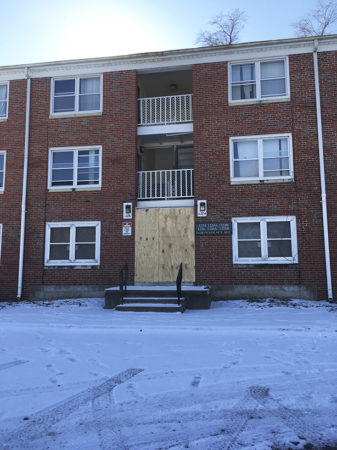The final tenants at the Chouteau Courts housing project officially moved out of the development on January 6, 2018, marking a crucial step in an ambitious plan to revitalize the Paseo Gateway area and improve the flow of traffic between Historic Northeast neighborhoods and downtown Kansas City.
A key tenant of the Paseo Gateway Project – which began in earnest in 2015, after the Housing Authority of Kansas City won a $30 million Choice Neighborhoods Housing and Urban Development (HUD) grant – is the creation of affordable housing for former tenants of Chouteau Courts. Many of those tenants have been moved to temporary housing, though some have found permanent housing in the form of two completed Paseo Gateway Project developments: Rose Hill Townhomes and Pendleton Flats.
John Monroe, Director of Planning and Development for the Paseo Gateway Project, told the Northeast News that as as of January 1, 2018, roughly half a dozen tenants were still living in Chouteau Courts.
“Some people were just reluctant to move, others had Section 8 vouchers but couldn’t find the right apartment,” Monroe said.
By January 6, though, all tenants had either found new homes on their own, or had been moved to temporary housing by the Housing Authority. As recently as October of 2016, Chouteau Courts still had roughly 120 residents living there. Rose Hill Townhomes, which includes 33 low-income units, was the first development completed. The mixed-income Pendleton Flats followed with 10 low-income units.
Next, Paseo Gateway partners are working to begin construction on Quinlan Place, Quinlan Row, and Pendleton ArtsBlock. After all is said and done, the Paseo Gateway Project is expected to create more than 200 affordable units. Monroe noted that groundbreaking ceremonies for those three developments are tentatively scheduled for February 28, when the Housing Authority hosts its annual progress report at the Northeast Community Center.
Monroe added that financial closing of the Quinlan developments occurred just before the end of 2017.
“We closed the Quinlan’s on December 29, the last day of the year,” Monroe said. “There was a big push to get that done.”
The Pendleton ArtsBlock project, meanwhile, is currently going through a soil testing process.
“If that’s clear, then that gets refilled with structural fill,” Monroe said. “Then we’re going to actually start construction, hopefully by February 1.”
Despite the progress, some question marks remain for the Paseo Gateway Project. Roughly 25 low-income units that had once been pegged for a mixed-income development in the Northland have been temporarily put on hold as the Housing Authority faces resistance from Northland residents who don’t want to take on the 25-30 potential Chouteau Courts residents who might be relocated to the new development.
Monroe suggested that negotiations with Northland leaders to identify a development site are ongoing.
“We’ve had regular discussions with them to try to move this forward,” Monroe said. “We’d like to identify and commit to a site within the next 60 days.”
Last month, Brinshore Development CEO David Brint – whose firm is constructing the housing developments for the Paseo Gateway Project – commented on the state of negotiations to identify a development site in the Northland. Brint noted that Brinshore isn’t rushing towards a solution for the project’s proposed Northland development. In the summer of 2017, Northland residents stormed a community meeting about the project to voice displeasure about the mixed-income development being considered. Still, Brint remains optimistic that an agreement can eventually be reached.
“We’re working with Northland neighbors and other interested parties there. We sort of have everything on the table,” Brint said. “At this point, we’re moving in a positive direction.”
Another open question is the future of the Chouteau Courts site. Now that tenants have been vacated, the Housing Authority can get to work on the next step: razing the property. Monroe said that the Housing Authority submitted an environmental study for City review on December 22.
“We’ve completed our environmental survey, and we also did and asbestos survey,” Monroe said. “There were some very small findings on asbestos, so that will have to be abated.”
If the City approves the environmental study, the next step is to submit a demolition application to HUD. Once the asbestos abatement concludes, and assuming the demolition application is approved, the Housing Authority will put out bids for demolition. From there, the Paseo Gateway team will look to find a creative re-use for the site – or sell the property to a private developer.
Monroe did, however, assure the Northeast News that the Housing Authority has dismissed at least one possibility for the site: a new, publicly funded housing development.
“We’re totally open; but we’re not going to put any housing on there,” Monroe said.



















